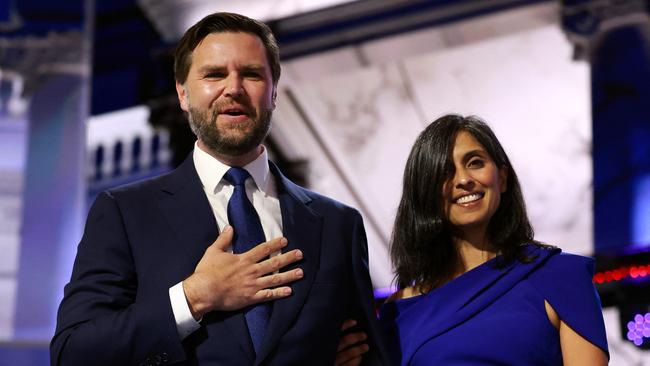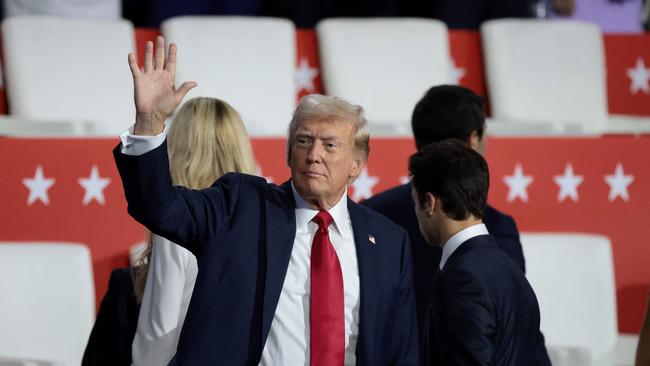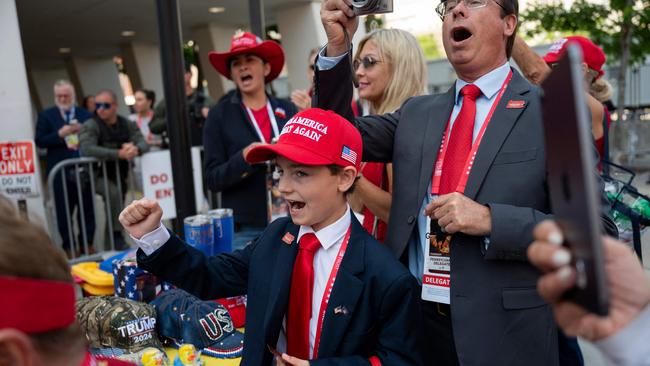Rise of the new Republican Party under Donald Trump
Patriotic country and western music, ear patches, costumes and USA chants. Trumpism has officially overthrown the Republican Party.

He called God to his side, spoke emotionally about an authentic personal experience, expressed appreciation for others, expressed sympathy for others, rose above his nominal opponent, Joe Biden, and made a semi-plausible call for national unity.
The staging of the speech was flawless and involved all the astonishing showmanship of Trump, live production TV, the idiom of world championship wrestling and the new Republican Party in a way in all its pomp.
Trump is winning this campaign, and it’s not just by luck. The lead-in to Trump was an amalgam of key parts of his voting coalition. Hulk Hogan – yes, that Hulk Hogan – told the crowd: I know tough men and Donald Trump is the toughest of them all.
Franklin Graham, the son and inheritor of Billy Graham, the 20th century’s most important Christian evangelist and religious leader, pointed to all the things Trump did in his first term to protect religious freedom. He then led the assembly in a lengthy prayer for Trump and for the American nation.
Then came rapper Kid Rock, shouting Trump’s praises, followed by the president of Ultimate Fighting Championships. These speakers were appealing respectively to people who don’t often vote, to evangelicals who have been core to the Republican Party since Ronald Reagan in the 1980s, and to people who listen to rap music, who don’t often vote Republican.
Trump’s wife, Melania, and his daughter Ivanka, not often seen on this campaign, were there for the Donald aria.
Trump launched into quite a moving account of the shooting he survived. It was moving because it stuck to the facts. He did eventually get on to policy substance but it was the moody stuff that carried the weight.
As ever, Trump overstated everything. The words: “I felt very safe because I knew I had God on my side”, when used for a political purpose, must make every believing Christian squirm in discomfort.
“I stand before you only by the grace of almighty God” seemed much more acceptable.
Still, it was a commanding and powerful performance by Trump. It involved some change, some evolution, of his core brand. If ever such development was going to be possible for Trump it’s possible in the wake of the assassination attempt.
The Republican National Convention was not just a coronation for Trump. It was a Trumpian celebration of all things Trump.
It figured Trump himself as a pervasive presence and, of course, the triumph of Trump’s decisive speech to the convention. It was the unveiling, too, of the new prince of American Trumpy conservatism, JD Vance.
But it was more than that. It was the presentation of a new Republican Party, a populist party of the working class and the nationalist-minded of every race and creed, so long as they love America.

The president of the 1.3 million Teamsters union, which has endorsed Democrats in every race this century, spoke at the Republican convention.
There were tears and cheers throughout, patriotic country and western music, so many pulls at so many heartstrings. A 98-year-old World War II veteran spoke: “If Donald Trump is back as commander in chief, I’ll re-enlist and storm any beach America needs me to.”
Was there a dry eye anywhere?
Up went the chant: “USA! USA! USA!”
The final policy disposition of this new Republican Party is unclear. Trumpism, Make America Great Again, national conservatism: these terms have meaning, but they are fluid, still not yet a fully formed ideology of government or society. They have a lot of promise, they have also a lot of danger.
Trump has the wind at his back. He looks unbeatable. Joe Biden stares into the abyss. And yet the vagaries of politics are never certain, especially more than three months before the actual election.
All the fates and furies of the universe nonetheless seem determined for the moment to make Trump president once more.
As the Republican convention unfolded, every day brought fresh aid to Trump, fresh despair for Biden.
A powerful speech from new-boy Vance, focusing on his remarkable life story, mixed with the necessary servile obeisance to Trump himself, offered great promise.
The tragic assassination attempt on Trump, which killed an innocent and decent family man heroically protecting his own loved ones, has infused Trump with a moral stature he never had before. And a broad public sympathy.
This is absolutely central. The riot against the Capitol on January 6, 2021, tarnished Trump’s reputation dreadfully and cast a backward glow of illegitimacy over his whole presidency, much of which had in fact been reasonably successful.
Now the assassination attempt has cleansed Trump, revealed a Trump of courage and defiance, a man who, literally, took a bullet for his country and rose, bloodied, with courage and composure, to show leadership and resolve.
Single events often get forgotten quickly. Surely this won’t be forgotten.
Biden has long claimed to be arguing for greater civility in politics while calling Trump an existential threat to democracy. Just before the assassination attempt, Biden called for Trump to be “put in the bullseye”. Can you imagine the reaction if Trump said that just before an assassination attempt on Biden?
In a TV interview in which, almost unheard of in the Biden presidency, the interviewer asked some tough questions, Biden admitted it was a mistake to use the bullseye metaphor. In Washington, where I’ve spent the past two weeks, the consensus is that Biden’s candidacy is terminal.
Trump chose the brilliant young Vance as his running mate, a risky choice because Vance, in among his brilliance, has said some foolish and irresponsible things, but the choice indicates a self-confident candidate. In part, this is Trump’s move to institutionalise the MAGA revolution among Republicans.

The long-held fantasy that when Trump leaves the stage Republicans will revert to their Reagan-Bush identity of free trade, low taxes, strong defence and global alliance leadership is no longer tenable. And yet ideology is not everything.
Vance’s youth and energy underline the contrast between the drive and liveliness of the Trump-Vance ticket, as opposed to the feeble, senescent, ageing leftism of Biden and Kamala Harris.
Trump is running well ahead of Biden, but he still has weaknesses and could still lose, inconceivable as that may look right now. Napoleon demanded: Give me lucky generals. This week, luck turned all ways for Trump. Not only did he dodge the assassin’s bullet, it turned out the Iranians, discovered by American intelligence, were also plotting to kill Trump.
Trump was tougher on Iran, one of America’s deadliest enemies, than Biden or, before that, Barack Obama. Now the Iranians want to kill Trump. Trump took a bullet for America. He defied the Iranians for America.
A contrast with Biden? You think? As everything turned to gold for Trump, it turned to dust for Biden. As the ailing, octogenarian President desperately tried to show he was fit and could do the job, he started shouting his speeches. Shouting apparently helps him, but it’s very weird. Then Biden came down with Covid. A bullet can’t stop Trump, as one commentator remarked, but a virus stops Biden.
As Biden gingerly, slowly, limped up the steps to Air Force One, even CNN, a committed pro-Democrat network, commented that he looked like a frail, unwell old man struggling to walk upstairs.
Congressman Adam Schiff became the highest profile Democrat politician to publicly call on Biden to pull out of the race. Senate leader Chuck Schumer reportedly told Biden privately he had to withdraw. Schumer didn’t deny this. Former Speaker Nancy Pelosi reportedly told Biden the polls showed he couldn’t win. Then came the bombshell for Biden, reports that Barack Obama had privately told associates he didn’t any longer think Biden was likely to win.
But one danger in politics is to peak too early. The Democrats have more problems than just Biden. Their policies have led to high inflation, uncontrolled illegal immigration, soaring energy prices and the invasion of woke ideology throughout schools and institutions all over American life.
Nonetheless, Biden himself, as opposed to his policies, is a big part of the Democrats’ problems. If Democrats crowbar Biden out of the presidential candidacy and put in a better candidate, Trump could yet be in for the fight of his life.
It would be wrong to underestimate Harris. She has poor approval ratings, has achieved nothing as Vice-President, is a poor debate and a California liberal. But Trump can look very much a bully, unattractively awkward, when he attacks female opponents. If the Democrat machine could manage an already doddery Biden into the White House four years ago, don’t think they won’t have a chance with Harris. Or the Democrats could go one better and choose a stronger candidate, like Michigan Governor Gretchen Whitmer.
Trump still has a net negative approval rating. He has been a colossal force in politics, completely unimaginable as recently as 2015, and now dominates the Republican Party. But half of America still has the gravest doubts about him.
For all that, Trump has done most things right over the past few weeks. He has been disciplined, restrained at times, he has softened the Republican Party platform on contentious issues and he has presided over the Republican convention with benign, regal serenity.
Trump looks more formidable than he did four years ago, or eight years ago. In Vance he has a soulmate. Nonetheless, both Trump and Vance have said recently some things that are worrying and should concern allies like Australia.
Trump says he will put a tariff of 10 per cent on all imports into the US. If he did that it would hurt the American economy, raise prices for all American families and damage the less well off more than the affluent. Trump is the leading candidate for president and his most repeated and earnest commitments deserve to be taken seriously. Biden is also a tariff protectionist. Yet it’s likely Trump looks on the universal 10 per cent tariff as merely the first play in a negotiation. This approach is maddening and destabilising and yet it’s not as inherently incoherent as it first looks. The integrating idea is Trump’s vision of nationalism.
Trump also said this week that he thought Taiwan should pay the US for security protection, that the US gets nothing from Taiwan and has no inherent reason to protect Taiwan. Trump’s overall theme, taken up strongly by Vance, is that allies are free-riding on the US. Inconveniently, that’s substantially true. And it includes Australia.
In truth, Taiwan, as an exemplary democracy, deserves support. Further, it would be disastrous for the US position in Asia, for the whole of Asia, if China conquers Taiwan and can project its military power across Japan to the south and all the way east to Hawaii.
The US interests are enormous. John Bolton, president Trump’s national security adviser, wrote in his White House memoir that there was always a strong chance Trump would sell Taiwan out in exchange for a deal with China’s Xi Jinping.
Yet here again, Trump is unpredictable on both the upside and the downside. The Chinese understand, and have certainly been told, that if they take actions that humiliate Trump and make him and his administration look weak and beaten, or even credibly threaten such action, then all bets are off.
The pro-Trump case among hawks is that America will be stronger under Trump than under any possible Democrat. A Trump Republican administration will spend more on defence than any Democrat would. The economy will be more robust. America’s enemies will be more worried about what Trump might do if they push him too far.
Not only that, Trump has helped create the situation in which the whole US political class is critical of China and sees the Chinese Communist Party as America’s adversary. It’s one thing to do a trade deal with China. It’s another thing altogether to cede Taiwan to China.
More concerning than anything, Vance has said he doesn’t care what happens in Ukraine. Trump has opposed US aid to Ukraine and his foreign policy surrogates talk of the Europeans financing Ukraine’s military resistance to Russia. Trump also, rather bizarrely, has claimed he’ll end the Russia-Ukraine war in a single day, in the time between his presumed election in November and inauguration in January.
That’s completely unbelievable. What Trump plainly has in mind, and it’s probably what Biden in fact has in mind as well, is freezing the conflict and getting a ceasefire, which becomes a peace agreement. This would be bitter for the Ukrainians for they would have lost Crimea and parts of eastern Ukraine forever. However, if they were given real security guarantees, such as EU and NATO membership, they could feel that they’d preserved their nation.
It’s going to be very messy and unsatisfactory whatever happens.
Trump’s first term, before he disputed the election result, is mostly reassuring on substance. The economy did well. America was strong. No ally was abandoned or betrayed. And no one much messed with America.
But Trump had conventional Republicans in the key cabinet positions. That’s less likely to be the case this time. The first evidence for that is the selection of Vance as vice-president. In 2016 Trump chose Mike Pence, a sober, responsible, reliable established Republican governor.
Yet it’s also fair to say that Vance has about as much experience going into the vice-presidential candidacy as Barack Obama had when he ran for president.
Vance’s memoir, Hillbilly Elegy, is a classic, one of the greatest books by a presidential or vice-presidential candidate. It ranks with John McCain’s Faith of My Fathers, and is much better than Barack Obama’s Dreams from My Father. It’s still well behind the memoirs of Ulysses S. Grant, who went from civil war general to president, but that was a different time. Giants strode the land then.
Hillbilly Elegy, more than any other single book, explains why a Trump presidency was possible in the first place. As Vance depicted in searing and engrossing prose, in a compelling and frightening and inspiring story, globalisation left many American communities abandoned. Their interests were sacrificed for free trade and corporate profit. Their love of country was mocked, their religion was mocked. They came to hate the liberal elites who betrayed and scorned them. Trump was their defiance and their vengeance.
Vance emerged well from a terrifying childhood due to the tough love of his grandmother. As he referenced in his speech, she was a paradox, a deeply religious woman, always with her Bible, who nonetheless swore constantly, seldom went to church, kept loaded pistols all over the house and was as tough as teak. But she literally saved Vance, who justified her faith in him by joining the marines, then becoming a lawyer, finishing with high honours from Yale law school.
Many conservatives across the Anglosphere have become national security conservatives, putting the need for a manufacturing base and for control of key supply chains above the efficiencies that free trade and just-in-time supply chains offer. Vance is a bit beyond that. Initially he was highly sceptical of Trump, but now he has embraced Trump as someone who works for his type of community.
On the other hand, Trump’s tax policies were very sympathetic to Wall Street interests that Vance is inclined to denounce. Vance wants to inherit the MAGA movement, so he’s very unlikely ever to defy Trump. Unfortunately, part of the price of getting inside the Trump tent, for Vance at least, has been to buy into the toxic fiction that the 2020 election was unlawfully stolen from Trump.
Yet speaking at the RNC, Vance stressed that sometimes he persuaded his colleagues and sometimes they persuaded him. He communicated openness to change. The Trump-Vance ticket at one level therefore offers a great deal of uncertainty.
But in reality most presidential tickets are like this to some extent. In 2020 Biden ran as a centrist yet has governed as an increasingly left-wing progressive. Trump-Vance may be no more fundamentally unpredictable than Biden was.
Trump won’t want America to be pushed around and he won’t want it humiliated by having its closest allies attacked. All presidencies, and all foreign policy, are transactional to some extent. With Trump this will be naked, perhaps extreme.
The Trump campaign has not produced any ads from Biden’s woeful performance in the TV debate three weeks ago because they actually don’t want to push Biden out of the race. But if the Democrats get their act together and find a better candidate, the US could be at a fundamental fork in the road: progressive liberalism versus national conservatism, as starkly delineated as any time in history. Perhaps this is the most important election after all.






Donald Trump performed his most outlandish, shapeshifting, unbelievable reality TV performance surprise twist of all time at the Republican National Convention. Of course, he went on too long.